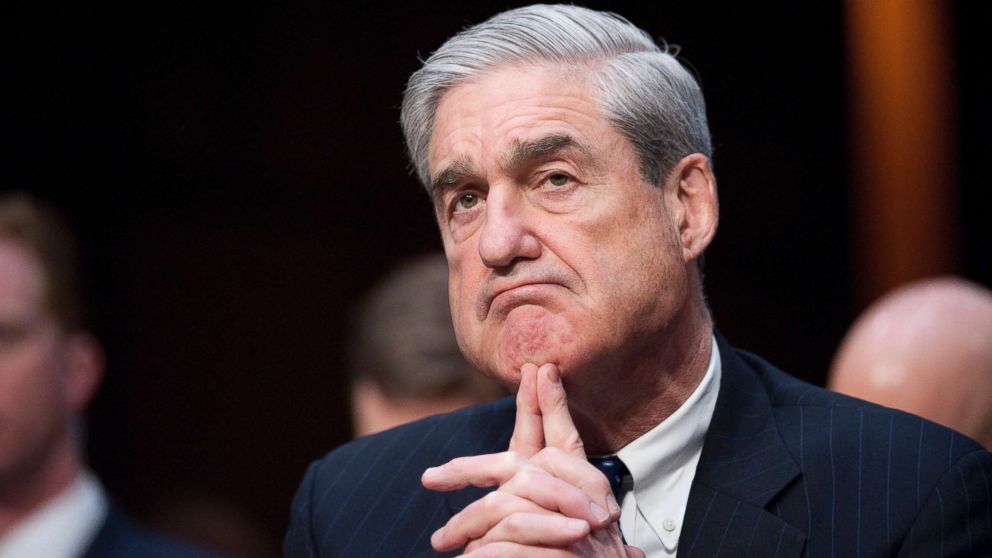Image Credits: CQ-Roll Call via Getty Images, FILE.
Since I’ve been hammering on this issue for months and months, you’ll understand why I am so gratified to see this piece by Joshua A. Geltzer and Ryan Goodman published in the New York Times today.
The Mueller report isn’t actually close to a full account of the investigation by the special counsel, Robert Mueller. That’s not just because of the redactions. When he was hired, Mr. Mueller inherited supervision of an F.B.I. counterintelligence investigation. That is the missing piece of the Mueller report.
President Trump may claim “exoneration” on a narrowly defined criminal coordination charge. But a counterintelligence investigation can yield something even more important: an intelligence assessment of how likely it is that someone — in this case, the president — is acting, wittingly or unwittingly, under the influence of or in collaboration with a foreign power. Was Donald Trump a knowing or unknowing Russian asset, used in some capacity to undermine our democracy and national security?
Whether we’re trying to recruit people in foreign countries to spy for us or we’re trying to prevent foreign countries from recruiting our own citizens as spies (or discover if they’ve already succeeded), we want to look for the same things. Are there unexplained assets or large debts? Does this person have the money they need to pay for their kid’s college education or their spouse’s cancer treatment? Has the person committed some crime that has so far gone undetected by the authorities? Are they having an affair or do they engage in other embarrassing sexual acts? Do they have the kind of access or information they can trade? Do they engage in suspicious travel or have improbable contacts? Do they have major character weaknesses like greed or feel slighted by their own government? Are they saying or doing things of a political nature that are hard to explain?
This is basic intelligence work. Ask yourself how someone like Paul Manafort would fare under that kind of scrutiny. He checked every box. Donald Trump checks most of them and adds a few more that I didn’t mention. He has been subject to blackmail by the Russians since the moment he signed a letter of intent to build a skyscraper in Moscow in October 2015, if not long before that. He spent the last days of his campaign paying off mistresses. He’s run a fraudulent “university” and a fraudulent charity, both of which have been shut down by the authorities. He’s engaged in campaign finance violations, tax evasion, bank fraud, wire fraud, and insurance fraud. He’s famously vain and greedy, known for his legendary grudge holding, and exceptionally dishonest. He won’t reveal his tax returns both because he’s nowhere near as wealthy as he wants us to believe he is and because he cheats on his taxes. And he says things of a political nature that are hard to explain all the time, especially about Vladimir Putin and Russia. He’s engaged in highly suspicious financial transactions with Russians, like the 2008 sale of a tear-down mansion to Russian oligarch Dmitry Rybolovlev for $95 million. He has a long history of doing business with both Sicilian and Russian mobsters.
Donald Trump would never get a security clearance because he’s a counterintelligence nightmare. He doesn’t necessarily have to be part of some adversary’s plan to deliberately “undermine our democracy and national security,” to be unacceptably vulnerable to such a plan. The primary reason why Fusion GPS was hired to investigate Trump’s foreign entanglements was because people wanted to understand why he was so solicitous of Vladimir Putin in 2015 while campaigning for the Republican nomination. The reason a counterintelligence investigation was opened on him was because he was more interested in shutting down an investigation of Russian interference in our election than in preventing them from doing it again. He was attempting to remove sanctions on Russia at a time that the Obama administration was implementing new sanctions. He was refusing to accept the assessments of the American intelligence community and giving more credence to the weak denials of the Russian government. He was setting up backchannels so he and his team could communicate with Russia without detection by our own counterintelligence teams. He was spouting the Kremlin line on Syria and Crimea and bad-mouthing NATO, the European Union, and the leaders of our closest allies.
The most important thing for our country is not whether it can be proven that the Trump campaign was coordinating with Russia during the campaign, but whether he is coordinating with them now, as president. The Mueller Report we need to see is their counterintelligence assessment. As former CIA officer and Department of Energy counterintelligence chief Rolf Mowatt-Larssen chief explains, this report is not a legal document.
…not reaching the legal standard for prosecution does not “exonerate” anyone from being guilty of espionage-related activity. That is a separate determination based on different standards evidence that applies to prosecution.
Historically speaking, it is common for FBI and CIA to have gathered sufficient evidence against a target of a counterintelligence investigation to establish that someone is a spy. In many cases, however, there is insufficient evidence to arrest and prosecute that person. It can take years to reach the legal threshold for prosecution for espionage activity even if the counterintelligence case is compelling.
This is one more reason why Mueller punted his investigation to Congress. But Congress cannot act without all the information.
